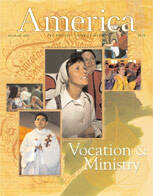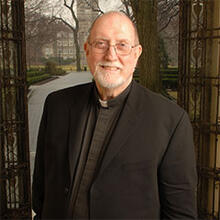In the week before my ordination 35 years ago, America published an article I had written entitled “Why I Want to Be a Priest” (6/8/68). I recall the circumstances in which I wrote it. Many friends with whom I had entered the Society of Jesus in the late 1950’s had come to different understandings of their calling as Catholic Christians over the years since we had entered. Several who were close friends had left the Society, including one who left just before we were to be ordained deacons.
All of these experiences, coming as they did in the wake of the Second Vatican Council and its new emphasis on the role of the laity in the church, provoked me to think through in print why I wanted to be ordained a priest. Was it simply to bring to its conclusion a process of education and formation I had begun more than a decade earlier? Looking back at the article 35 years later, I am amused and even a trifle bemused by what I thought of the priesthood I was about to take up in 1968.
Like so many of my Jesuit contemporaries at the time, I wondered whether I would participate very much over the years to come in the preaching and sacramental life of the church, in the ordinary sense of those words. A Jesuit, especially a Jesuit who is an academic, is often less involved in the daily liturgical life of the laity than a diocesan priest might be. But I had not factored in the African setting in which I was to do most of my priestly work. I have spent 23 of the past 35 years in Nigeria and Ghana.
I thought in 1968 that my future ministry of the word would mainly consist of teaching and a certain witnessing to God and the truth in an academic setting. As a matter of fact, however, I have found much satisfaction over these years in preaching, not only as a university chaplain in the African tertiary institutions where I taught but also in local outstations. These are smaller worship communities, less than a full parish, usually in rural areas but sometimes found in burgeoning cities as well.
When those academic institutions were sometimes closed down by military dictatorships or as the result of strikes by the university staff, I realized how much I missed the daily work of the chaplain and how little I actually missed the classroom. In Africa, especially, the spoken word is much revered in a religious setting, and congregations do not like a homily to be too short or too dispassionate. The best homilies in Africa involve a certain amount of dialogue back and forth between the homilist and the congregation, especially in an outstation. The academic monologue, no matter how well intentioned, is less popular, even in a university.
The Eucharist had always played a major role in my life even before I was ordained. The other sacraments had not played much part in my life as a seminarian, but they were eventually to loom larger in my life.
I can never forget a night more than 20 years ago, during a time of civil unrest in Ghana. I lived at the time in a remote corner of the campus of the University of Ghana. Around two in the morning a complete stranger arrived at the door, asking me to come to the local hospital to anoint his dying brother, a university employee until then unknown to me. I soon discovered why I did not know the man. He had not practiced as a Catholic for many years. But now he was dying of long-neglected hepatitis. Against the shouted advice of the old Ghanaian gentleman who was my cook and general factotum at the time, I left with the sacramental oils for the hospital.
When I entered the room the man was breathing heavily, his mouth largely obstructed with tubes. A tube extended as well from the area of his very swollen liver. The liturgy of the Anointing of the Sick provides the possibility of sacramental confession shortly after the ritual begins, but I sensed, somehow, that even the brief reading from the Letter of James that precedes the confession might prove too long for this dying man. His eyes closed, the sick man obviously wanted to respond to me when I asked him if he wished to confess his sins. Of course, given the tubes in his mouth, there was nothing he could say. I asked him to squeeze my hand if he was sorry for his sins. Instead, and very vehemently, he shook his head affirmatively. I hastened to the formula of absolution. I continued to hold his hand as I began finally the reading from James. By the end of the reading I could feel his body growing cool: he had died about one minute after I absolved him.
The dead man’s brother, who had spent several hours wandering around the darkened university campus looking for my bungalow, did not even realize that his brother was dead. When he did realize it, at the conclusion of the ritual, he burst into tears. I wept as well, not in sorrow but in joy that this heroic man had persisted until he found me and brought me and sacramental absolution and anointing to his brother’s deathbed.
So there turned out to be more of traditional priestly work waiting for me—but never as much as parish ministry involves—even as a Jesuit academic, perhaps because of Africa. I sometimes think that I am still a priest 35 years later precisely because of experiences like the one just detailed—experiences for which I owe the bright continent and its Creator all thanks and praise.
Finally, I should mention that a misprint that crept into the article between its birth on my typewriter and its appearance in America added a nice comic twist to the whole matter. I left Woodstock College (then in rural Maryland) less than a week before the article appeared. It was a momentous week: Senator Robert Kennedy was assassinated during it, barely two months after the assassination of the Rev. Martin Luther King Jr., a traumatic event that occurred on the eve of my ordination retreat. I had heroized both men and felt their loss very deeply.
It took me a couple of days during that week to notice, on re-reading the article, that one word had dropped out of it. I had really liked my years of theological formation at Woodstock and had said, in the original draft of the article, that “I do not feel cheated by the largely seminary education I have received, though I have to admit that the seminaries I have lived in were academically a cut above the average.” Alas, the not in the first part of that sentence dropped out. Perhaps someone on the staff of America felt that way about his own theological formation at an earlier period, or presumed that I was one of those newfangled younger men who were rebelling around that time against the scholastic theology and the religious style that had prevailed for so many years in Jesuit and other seminaries.
I quickly wrote a note to the editors of America asking them to correct that error in a forthcoming issue, which they did. I also asked them to send a letter to the rector and the faculty of Woodstock pointing out the misprint, which they also did. The letter was posted on the bulletin board at Woodstock before the date of my ordination. Father (now Cardinal) Avery Dulles, a man more fond of practical jokes than many may suspect who know him only from his writings, arrived to concelebrate the ordination of my classmates and me at Fordham University with a copy of a book of articles he had just published on ecclesiology and ecumenism. I had proofread the galleys of this book some months earlier. The inscription was vintage Dulles: “For Patrick J. Ryan, S.J., on his priestly ordination, and in memory of his seminary education.”
I sometimes think that the seminary education that I did not resent was only the beginning of a longer and even more fascinating education in the ministerial priesthood, an education that for me still continues.








